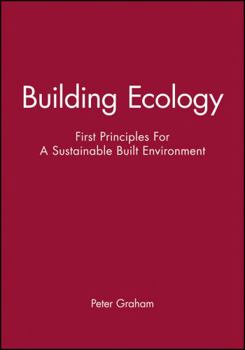Building Ecology: First Principles for a Sustainable Built Environment
Select Format
Select Condition 
Book Overview
Buildings consume 40% of our planet's materials and 30% of its energy. Their construction uses up to three million tonnes of raw materials a year and generates 20% of the soild waste stream . If we want to survive our urban future, there is no option but to build in ways which improve the health of ecosystems. Understanding the concept of ecological sustainability and translating it into practice as sustainable development is a key challenge for today's built environment professionals. The skill and vision of those who shape our cities and homes is vital to achieving sustainable solutions to the many environmental, economic and social problems we face on a local, national and global scale. Peter Graham offers here a holistic view of ecologically sustainable building by drawing on established areas of knowledge, demonstrating their relevance to the environmentally-conscious building professional and putting the process, product and impact of building into context. Case studies illustrate how sustainable principles have been applied successfully and discussion topics are offered to stimulate thought. Building Ecology will help planners, surveyors, designers and builders to incorporate sustainability into their everyday practice by: - showing which styles of building are ecologically sustainable - providing fundamental knowledge for making decisions using the principles of ecologically sustainable building - explaining a complex subject in a clear, balanced way. Building Ecology sets out the current scientific view of how nature works and how buildings link with and affect nature. It provides fundamental knowledge for building in harmony with nature and keeping Earth's life-supporting ecosystems healthy.
Format:Paperback
Language:English
ISBN:0632064137
ISBN13:9780632064137
Release Date:December 2002
Publisher:Wiley-Blackwell
Length:320 Pages
Weight:1.60 lbs.
Dimensions:0.5" x 6.6" x 9.5"
Customer Reviews
0 rating





